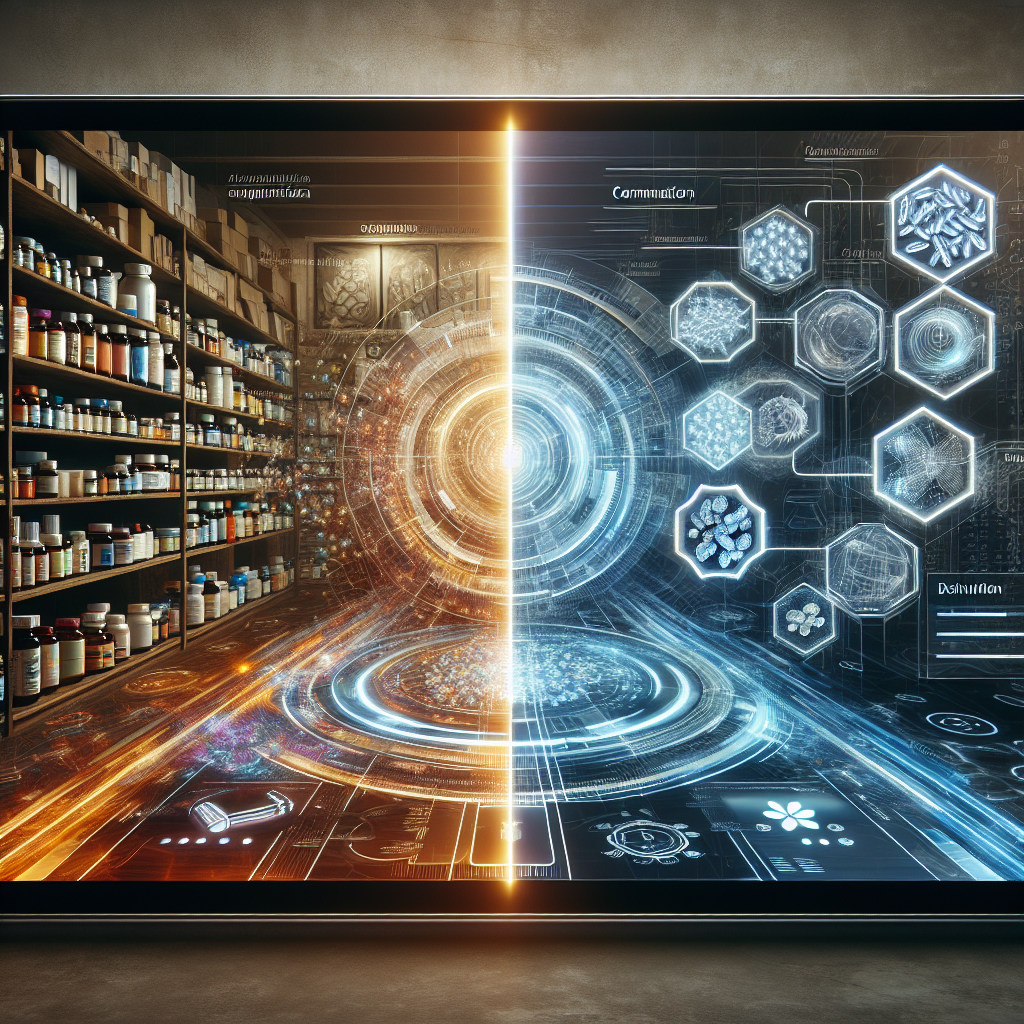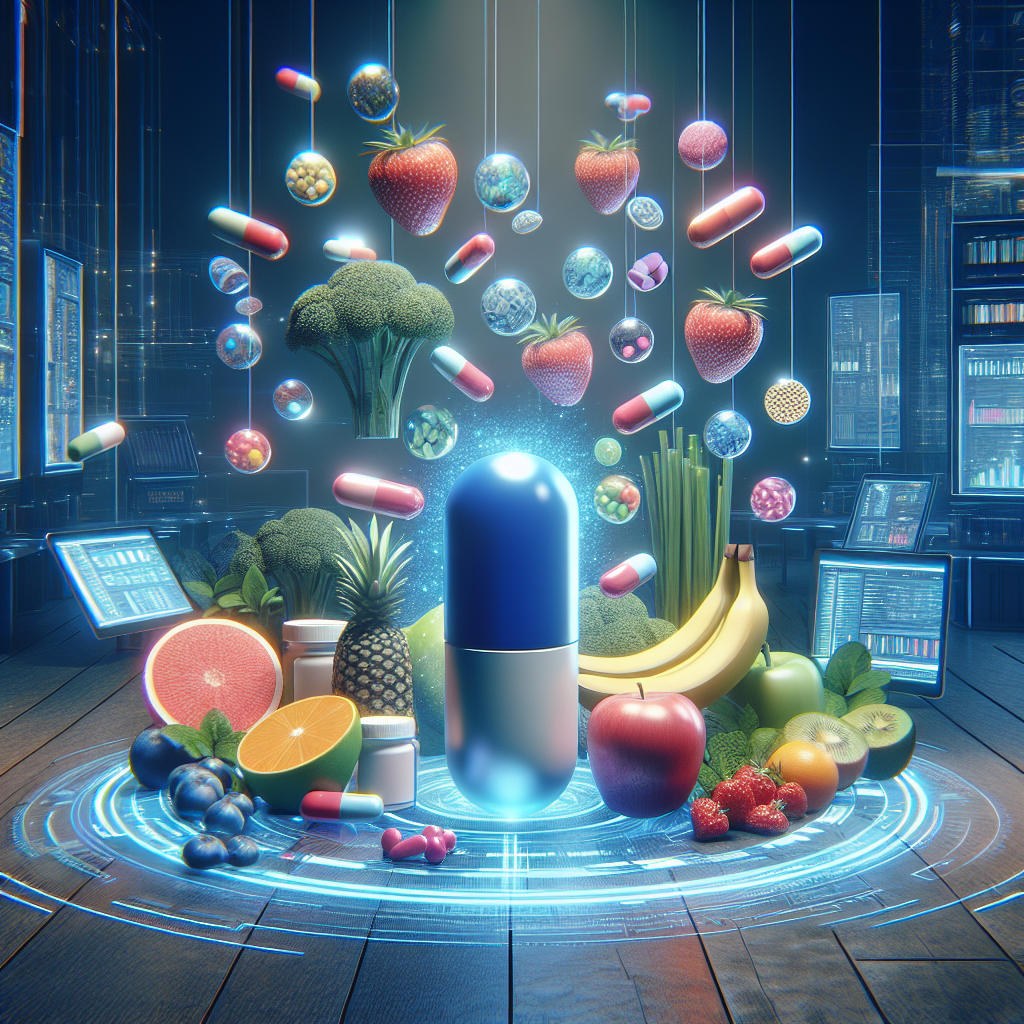The Intersection of Technology and Wellness: Vitamins

Discover the intersection of technology and wellness with our range of vitamins. Improve your health and wellbeing today. Click here to start your journey towards vibrant vitality.
Exploring the Role of Technology in Personalizing Vitamin Intake
The intersection of technology and wellness is a rapidly evolving landscape, with new innovations continually reshaping our understanding and approach to health. One area where this intersection is particularly evident is in the realm of vitamins. The role of technology in personalizing vitamin intake is a fascinating topic, offering a glimpse into the future of health and wellness.
Traditionally, vitamins have been consumed in a one-size-fits-all manner. We’ve been advised to take a multivitamin daily, with the assumption that this will cover any nutritional gaps in our diet. However, this approach fails to consider the unique nutritional needs of each individual. Factors such as age, gender, lifestyle, and health status can significantly influence our vitamin requirements. This is where technology steps in, offering a more personalized approach to vitamin intake.
The advent of technology has enabled the development of sophisticated algorithms that can analyze a person’s individual health data and lifestyle factors to recommend a personalized vitamin regimen. These algorithms take into account a wide range of variables, including dietary habits, exercise routines, sleep patterns, stress levels, and even genetic predispositions. The result is a tailored vitamin plan that is designed to meet the specific nutritional needs of the individual.
Moreover, technology has also facilitated the creation of at-home testing kits that can measure nutrient levels in the body. These kits typically involve a simple blood or saliva test that can be done in the comfort of one’s own home. The samples are then sent to a lab for analysis, and the results are used to determine the individual’s vitamin needs. This not only provides a more accurate picture of a person’s nutritional status but also allows for ongoing monitoring and adjustment of the vitamin regimen as needed.
In addition to personalizing vitamin intake, technology also plays a crucial role in enhancing the absorption and effectiveness of vitamins. For instance, advancements in nanotechnology have led to the creation of nano-sized vitamin particles that can be more easily absorbed by the body. This not only improves the bioavailability of the vitamins but also allows for more precise dosing.
Furthermore, technology has also revolutionized the way we consume vitamins. From vitamin-infused water and food products to wearable devices that deliver vitamins through the skin, the options are becoming increasingly diverse and innovative. This not only makes vitamin intake more convenient but also more enjoyable, thereby increasing adherence to the regimen.
While the intersection of technology and wellness in the realm of vitamins is exciting, it’s important to remember that technology is merely a tool. It can help us understand our nutritional needs better and provide more personalized and effective solutions. However, it cannot replace a balanced diet, regular exercise, and a healthy lifestyle. These remain the cornerstone of good health and wellness.
In conclusion, the role of technology in personalizing vitamin intake is a testament to the power of innovation in enhancing our health and wellbeing. As technology continues to evolve, we can look forward to even more personalized, effective, and convenient ways to meet our nutritional needs. However, it’s crucial to use these technological advancements as a complement to, not a substitute for, a healthy lifestyle.
The Impact of Tech Innovations on Vitamin Manufacturing and Distribution

The intersection of technology and wellness is a fascinating and rapidly evolving space, particularly in the realm of vitamins. As our understanding of nutrition and health deepens, so too does our ability to harness technology to improve the manufacturing and distribution of vitamins. This article will explore the impact of tech innovations on vitamin manufacturing and distribution, shedding light on how these advancements are revolutionizing the wellness industry.
In the past, vitamin manufacturing was a labor-intensive process, often involving manual labor and rudimentary machinery. However, the advent of automation and robotics has dramatically transformed this process. Today, sophisticated machines can accurately measure, mix, and encapsulate vitamins at a speed and precision that far surpasses human capabilities. This not only increases efficiency and reduces costs but also ensures a higher degree of consistency and quality control.
Moreover, technology has also enabled the customization of vitamins to cater to individual needs. With the help of advanced algorithms and data analysis, companies can now create personalized vitamin packs based on an individual’s unique health profile and lifestyle. This level of personalization was unthinkable a few years ago, but today it is becoming increasingly commonplace, thanks to the power of technology.
In addition to manufacturing, technology has also revolutionized the distribution of vitamins. E-commerce platforms have made it possible for consumers to purchase vitamins from the comfort of their homes, with just a few clicks. This has not only expanded the reach of vitamin manufacturers but also made vitamins more accessible to a wider audience.
Furthermore, the use of sophisticated logistics software has streamlined the supply chain, ensuring that vitamins reach consumers in the shortest possible time. This is particularly important for vitamins that have a short shelf life or require specific storage conditions.
The integration of technology in the vitamin industry has also led to increased transparency. Blockchain technology, for instance, allows for the tracking and verification of each step in the vitamin production process. This means that consumers can now trace the journey of their vitamins from the farm to the factory to their front door, providing an unprecedented level of transparency and trust.
Artificial Intelligence (AI) and Machine Learning (ML) are also playing a significant role in the vitamin industry. These technologies are being used to predict market trends, optimize inventory management, and even develop new vitamin formulations. By leveraging AI and ML, vitamin manufacturers can stay ahead of the curve and continuously innovate to meet the evolving needs of consumers.
In conclusion, the intersection of technology and wellness in the realm of vitamins is a testament to the power of innovation. From manufacturing to distribution, technology is reshaping the vitamin industry, making vitamins more personalized, accessible, and transparent than ever before. As we continue to push the boundaries of what is possible, there is no doubt that the future of vitamins is bright, and technology will play a pivotal role in shaping this future.
How Technology is Revolutionizing the Vitamin and Supplement Industry
The intersection of technology and wellness is a fascinating and rapidly evolving space, particularly in the realm of vitamins and dietary supplements. The vitamin and supplement industry, once a niche market, has exploded into a multi-billion dollar industry. This growth has been fueled by a combination of increased consumer interest in health and wellness, and the advent of new technologies that have revolutionized the way vitamins and supplements are developed, marketed, and consumed.
One of the most significant technological advancements in this industry is the development of personalized vitamins and supplements. Thanks to advancements in genetic testing and data analysis, companies can now create personalized vitamin and supplement regimens based on an individual’s unique genetic makeup, lifestyle, and health goals. This approach is a far cry from the one-size-fits-all approach of the past, and it’s proving to be a game-changer in the industry.
The use of artificial intelligence (AI) and machine learning is another technological innovation that’s reshaping the vitamin and supplement industry. These technologies are being used to analyze vast amounts of data to identify trends, predict consumer behavior, and develop new products. For example, AI can analyze data from clinical studies to identify potential new health benefits of certain vitamins and supplements. This can lead to the development of new products that are more effective and targeted.
Moreover, technology is also revolutionizing the way vitamins and supplements are marketed and sold. The rise of e-commerce has made it easier than ever for consumers to research and purchase vitamins and supplements. Companies can use digital marketing strategies to reach a wider audience, provide detailed product information, and engage with consumers in a more personalized way. Additionally, subscription services have made it convenient for consumers to receive their vitamins and supplements on a regular basis, eliminating the need to remember to reorder.
Furthermore, technology is also improving the transparency and traceability in the vitamin and supplement industry. Blockchain technology, for instance, is being used to track and verify the sourcing and production of vitamins and supplements. This not only ensures the quality and safety of the products but also builds trust with consumers who are increasingly concerned about the origins and contents of the products they consume.
Lastly, technology is also enhancing the consumption experience of vitamins and supplements. Innovations such as time-release capsules, chewable tablets, and gummy vitamins have made it easier and more enjoyable for people to take their vitamins and supplements. There are even smart pill bottles that remind users to take their vitamins and supplements, track their usage, and order refills automatically.
In conclusion, the intersection of technology and wellness in the vitamin and supplement industry is a dynamic and exciting space. The use of technology is not only revolutionizing the way vitamins and supplements are developed, marketed, and consumed, but it’s also empowering consumers to take a more proactive and personalized approach to their health and wellness. As technology continues to evolve, we can expect to see even more innovations that will continue to transform this industry in the years to come.